
Lester Alvin Burnett, better known as Smiley Burnette, was an American country music performer and a comedic actor in Western films and on radio and TV, playing sidekick to Gene Autry, Roy Rogers, and other B-movie cowboys. He was also a prolific singer-songwriter who is reported to have played proficiently over 100 musical instruments, sometimes more than one simultaneously. His career, beginning in 1934, spanned four decades, including a regular role on CBS-TV's Petticoat Junction in the 1960s.

Red River Valley, later retitled Man of the Frontier for American television screening, is a 1936 American Western film directed by B. Reeves Eason and starring Gene Autry, Smiley Burnette, and Frances Grant. Written by Dorrell and Stuart E. McGowan, the film is about a "ditch rider" and his sidekick who set out to find out who has been causing the accidents at a dam construction site.
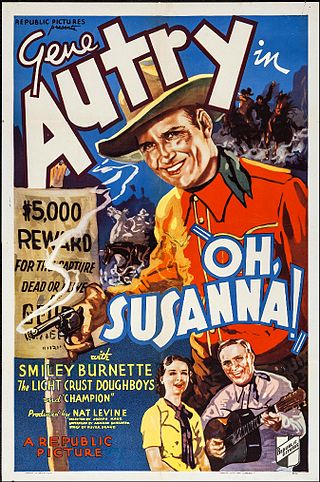
Oh, Susanna! is a 1936 American Western film directed by Joseph Kane and starring Gene Autry, Smiley Burnette, and Frances Grant. Written by Oliver Drake, the film is about a cowboy who is robbed and then thrown from a train by an escaped murderer who then takes on the cowboy's identity.

Public Cowboy No. 1 is a 1937 American Western film directed by Joseph Kane and starring Gene Autry, Smiley Burnette, and Ann Rutherford. Based on a story by Bernard McConville, the film is about a singing cowboy who chases down rustlers who are using airplanes, shortwave radios, and refrigerated trucks to steal cattle.
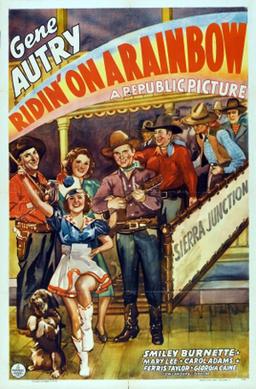
Ridin' on a Rainbow is a 1941 American Western musical film directed by Lew Landers and starring Gene Autry, Smiley Burnette, and Mary Lee. Written by Bradford Ropes and Doris Malloy, based on a story by Ropes, the film is about a singing cowboy whose investigation of a bank robbery takes him to a showboat, where he finds that a teenage singer's father has been working with the robbers to provide for her future. The film received an Academy Award nomination for best original song for "Be Honest with Me".

Home on the Prairie is a 1939 American Western film directed by Jack Townley and starring Gene Autry, Smiley Burnette, and June Storey. Written by Charles Arthur Powell and Paul Franklin, the film is about a cattle inspector's efforts to prevent a corrupt cattle rancher from shipping to market a herd of cattle infected with hoof and mouth disease.
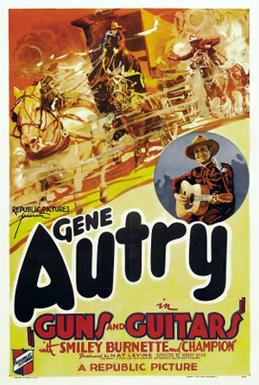
Guns and Guitars is a 1936 American Western film directed by Joseph Kane and starring Gene Autry, Smiley Burnette, and Dorothy Dix in her final film appearance. Written by Dorrell and Stuart E. McGowan, the film is about a singing cowboy who helps protect a county from fever-ridden cattle, and after being framed for murdering the sheriff, proves his innocence, gets elected sheriff, and then goes after the bad guy.
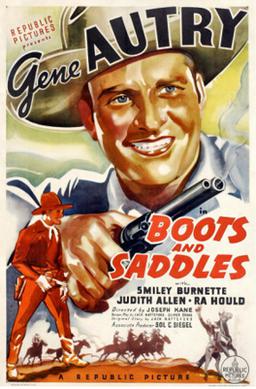
Boots and Saddles is a 1937 American western film directed by Joseph Kane and starring Gene Autry, Smiley Burnette and Judith Allen. It was produced and distributed by Republic Pictures. Based on a story by Jack Natteford, the film is about a young Englishman who inherits a ranch that he wants to sell, but is turned into a real Westerner by a singing cowboy.
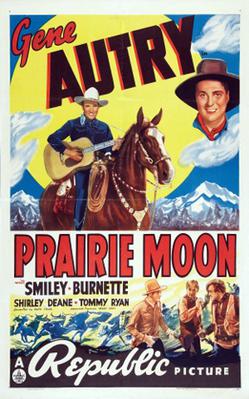
Prairie Moon is a 1938 American Western film directed by Ralph Staub and starring Gene Autry, Smiley Burnette, and Shirley Deane. Written by Betty Burbridge and Stanley Roberts, the film is about a singing cowboy who takes care of three tough boys sent west from Chicago after their father dies and leaves them a cattle ranch.

Mountain Rhythm is a 1939 American Western film directed by B. Reeves Eason and starring Gene Autry, Smiley Burnette, and June Storey. Based on a story by Connie Lee, the film is about a cowboy who organizes his fellow ranchers to oppose an Eastern promoter's land grab scheme.

Colorado Sunset is a 1939 American Western film directed by George Sherman and starring Gene Autry, Smiley Burnette, and June Storey. Written by Betty Burbridge and Stanley Roberts, based on a story by Luci Ward and Jack Natteford, the film is about a singing cowboy and his buddies who discover that the ranch they bought is really a dairy farm—and worse, it's subject to intimidation from a protection racket that prevents dairy products from safely reaching the market.

Rovin' Tumbleweeds is a 1939 American Western film directed by George Sherman and starring Gene Autry, Smiley Burnette and Mary Carlisle. Written by Betty Burbridge, Dorrell McGowan, and Stuart E. McGowan, the film is about a cowboy congressman who exposes a crooked politician who is delaying passage of a flood control bill.
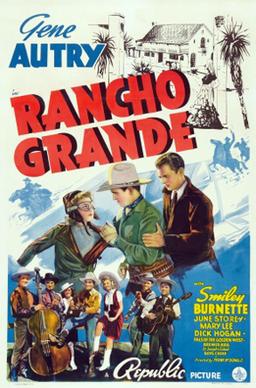
Rancho Grande is a 1940 American Western film directed by Frank McDonald and starring Gene Autry, Smiley Burnette, and June Storey. Written by Bradford Ropes, Betty Burbridge, and Peter Milne, based on a story by Peter Milne and Connie Lee, the film is about a singing cowboy and ranch foreman responsible for completing an important irrigation project and for the three spoiled grandchildren of his former boss who come out West to the ranch they inherited.
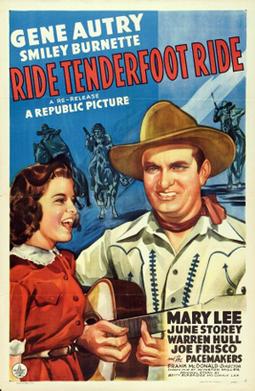
Ride, Tenderfoot, Ride is a 1940 American Western film directed by Frank McDonald and starring Gene Autry, Smiley Burnette, and June Storey. Written by Winston Miller, based on a story by Betty Burbridge and Connie Lee, the film is about a singing cowboy who inherits a meat-packing plant and must face stiff competition from a beautiful business rival.
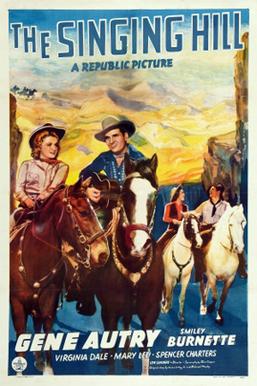
The Singing Hill is a 1941 American Western film directed by Lew Landers and starring Gene Autry, Smiley Burnette, and Virginia Dale. Based on a story by Jesse Lasky Jr. and Richard Murphy, the film is about a singing cowboy and foreman of a ranch that may be sold to an unscrupulous banker by the young madcap heiress who is unaware that the sale will result in the local ranchers losing their free grazing land and their ranches. In the film, Autry performed the 1940 song "Blueberry Hill", first recorded by Sammy Kaye, which would become a standard recorded by such artists as Louis Armstrong (1949), Fats Domino (1956), and Elvis Presley (1957). The song became one of Autry's best-selling recordings. In 1987, "Blueberry Hill" received an ASCAP Award for Most Performed Feature Film Standards on TV.

Back in the Saddle is a 1941 American Western film directed by Lew Landers and starring Gene Autry, Smiley Burnette, and Mary Lee. Written by Richard Murphy and Jesse Lasky Jr., the film is about a singing cowboy who attempts to bring peace between ranchers and the operator of a copper mine whose chemicals are poisoning the area's water supply. The film features several of Autry's hit songs, including "Back in the Saddle Again", "I'm An Old Cowhand", and "You Are My Sunshine".

Call of the Canyon is a 1942 American Western film directed by Joseph Santley and starring Gene Autry, Smiley Burnette, the Sons of the Pioneers, and Ruth Terry. Based on a story by Maurice Rapf and Olive Cooper, the film is about a singing cowboy who leads a group of cattlemen against the corrupt agent of a large packing company looking to swindle them by undercutting the buying price for beef. The film features three songs by Autry and the Sons of the Pioneers, including the classic "Take Me Back to My Boots and Saddle".

Sierra Sue is a 1941 American Western film directed by William Morgan and starring Gene Autry, Smiley Burnette, and Fay McKenzie. Written by Earl Felton and Julian Zimet, the film is about a government inspector investigating a poisonous weed that is destroying the rangeland supporting the area's cattle. The inspector must persuade the ranchers to reject a plan to burn the land and support a new process of chemical spraying from an airplane. The film features the popular Autry songs "Be Honest With Me", "Ridin' the Range", and the title track.

Cowboy Serenade is a 1942 American Western film directed by William Morgan and starring Gene Autry, Smiley Burnette, and Fay McKenzie. Written by Olive Cooper, the film is about a singing cowboy and cattleman who goes after a gambling ring after they fleece the cattlemen association's representative of their cattle. The film features the songs "Nobody Knows", and "Sweethearts or Strangers", and the title song.

Heart of the Rio Grande is a 1942 American Western film directed by William Morgan and starring Gene Autry, Smiley Burnette, Fay McKenzie, and Edith Fellows. Based on a story by Newlin B. Wildes, the film is about a singing cowboy and dude ranch foreman who helps a spoiled teenager and her business tycoon father discover what is most important in life. The film features the songs "Let Me Ride Down in Rocky Canyon", "Deep in the Heart of Texas", "Dusk on the Painted Desert", and "Rainbow In the Night" performed by Edith Fellows.




















